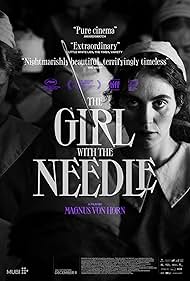Copenhagen 1919: A young factory worker finds herself unemployed and pregnant. She meets Dagmar, who runs an underground adoption agency. A strong connection develops, but her world is shattered when she discovers the shocking truth behind her job. Official Danish entry for the “Best International Feature Film” category at the 97th Academy Awards in 2025. It’s the last days of the Great War and Karoline is barely making a living working in a factory. She believes herself to be a widow because her husband disappeared during the war (even though Denmark didn’t actually participate), but doesn’t receive widow benefits because he wasn’t declared dead. There’s a lot going on in the film and I don’t want to give away any spoilers, so I won’t go into too much detail about the plot, except that the marketing is emphasizing something that isn’t as important in the film as you might expect. While this gets a lot of attention in the second half of the film, for me the real value of the film is the sense of reality that surrounds Karoline’s story. When was the last time someone in a film tried to convince a potential tenant to take an apartment by telling them that they could have running water for two full hours a day (from ten to noon, which may not be a big selling point since most people would be working during those hours)? When was the rampant drug use of the time portrayed with such candor? Even what Dagmar did was relatively common at the time, although I bet it was on the decline by then and it wasn’t happening as much as it used to. In fact, I might have enjoyed the film more if the marketing had been different and if Dagmar hadn’t been brought up, because it set expectations. While Dagmar is an important character, the film is clearly about Karoline and her struggles. On the other hand, it’s hard to say how I would have felt seeing Dagmar Overby’s name on a door if I hadn’t known in advance that this real person was being used in the film. (It’s worth noting that the film is inspired by real events rather than based on them, so they try to maintain some distance from the real Dagmar.) I feel like some of the audience will have a hard time sympathizing with Karoline, as she sometimes seems to make the right decision a little too late. At the same time, there’s not much time or opportunity for ethics when you’re just trying to survive in a world where the odds are stacked against you. On the other hand, even though we know that the hope she’s given wouldn’t do any good in this world, we still understand why she gives in to it. I like that aspect of the film. It’s in black and white, and the whole city seems decrepit and barely able to hold its own. It reminds us of the lack of concern for the welfare of the working poor, even the disdain they arouse. Have things really changed that much? The era depicted occurred over a century ago, but the concept of female bodily autonomy is constantly being challenged. Of course, any work of art is in some way a mirror of the time in which it was created, but it seems easier to see the similarities here.




 32/27
32/27